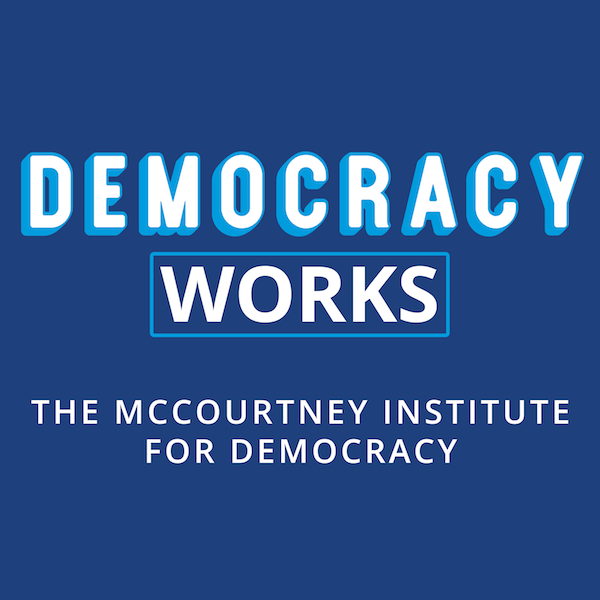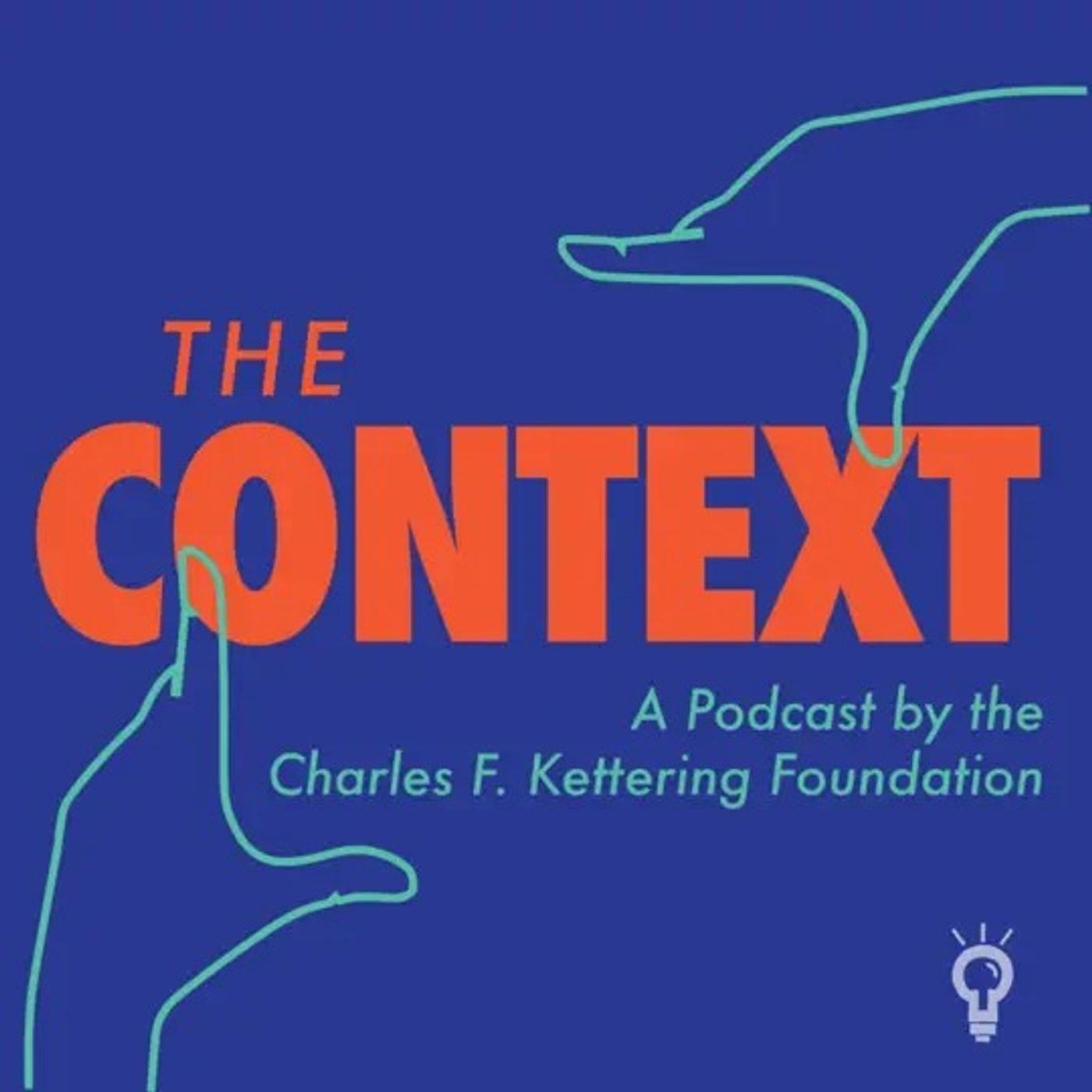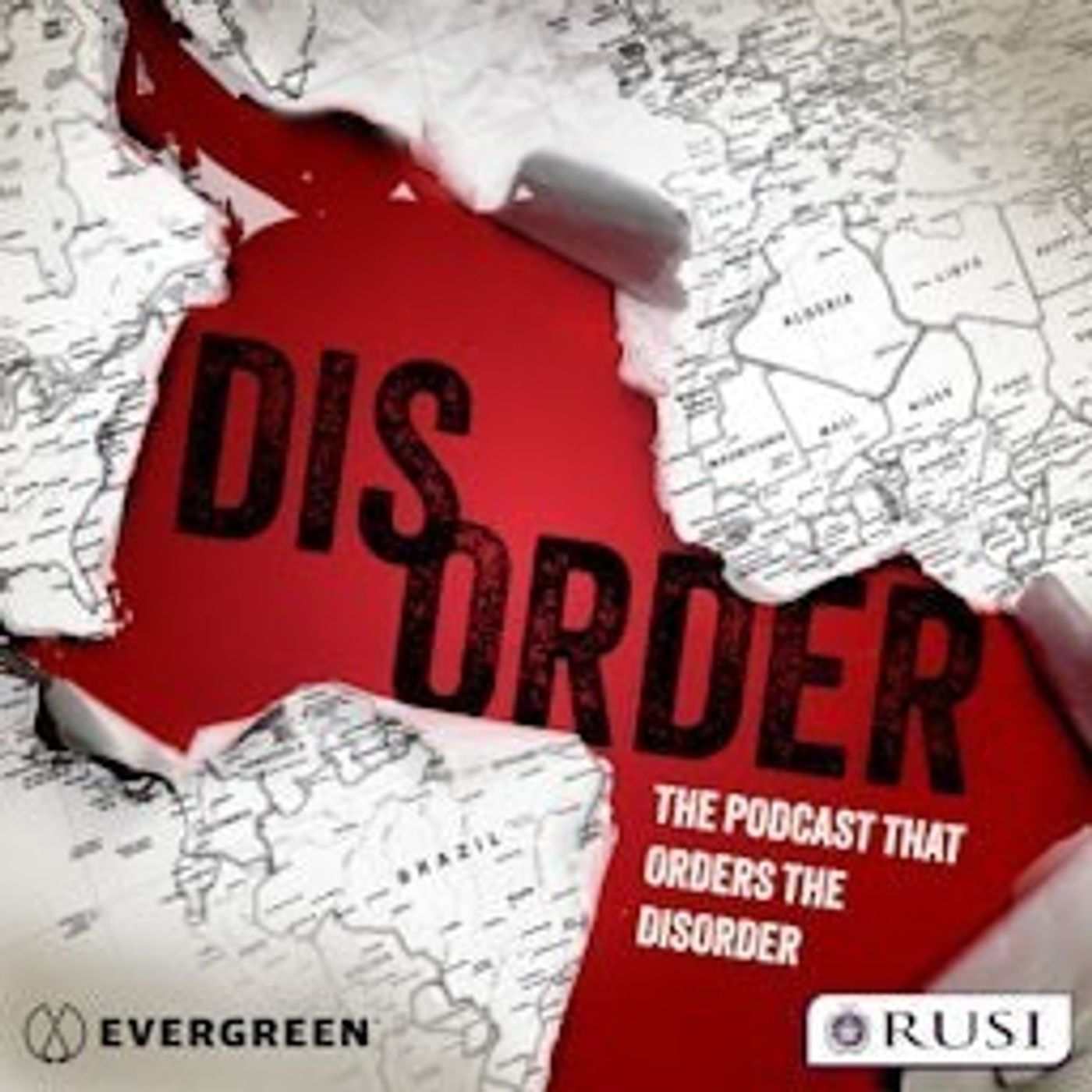Our podcast aims to rise above the daily news grind and have intellectually-engaging conversations about issues related to democracy.
Democracy Works podcast
Winner of a People’s Choice Podcast Award and CASE Circle of Excellence Award.


If you’re looking for partisan bickering or hot takes on the news, this is not the podcast for you. We aim to rise above the daily news grind to take a broader look at issues impacting democracy — which can be just about anything.
Why the name Democracy Works? It’s about people coming together to build things that are greater than the sum of their parts. Much like workers throughout Pennsylvania’s history built ships and trains at iron and steel works, each of us has a role to play in building and sustaining a healthy democracy.
You probably hear a lot these days about how democracy is failing. We can’t promise that the view will always be rosy on this podcast, but we can promise an examination of how people are trying to make democracy work.
Visit the podcast website for more information about the show and detailed show notes for each episode.
Our latest episodes:

In the aftermath of the U.S. intervention in Venezuela, we explore how rising political divides are leading to bigger swings in America’s foreign policy — and what that means for our future in the liberal international order.
In her book Polarization and International Politics: How Extreme Partisanship Threatens Global Security, Rachel Myrick argues that polarization reshapes the nature of constraints on democratic leaders, which in turn erodes the advantages democracies have in foreign affairs. We discuss how the pendulum swing from one administration to another leads to instability in foreign affairs. As a result, Myrick says the United States loses both reliability as an ally and credibility as an adversary. Myrick also questions the longstanding thinking that having a common enemy to focus on is enough to overcome polarization, as it was during the Cold War.
Myrick is the Douglas & Ellen Lowey Associate Professor of Political Science at Duke University. Her research explores how partisan polarization affects foreign policymaking in democracies, with an emphasis on U.S. national security policy.
Hosted by Simplecast, an AdsWizz company. See pcm.adswizz.com for information about our collection and use of personal data for advertising.

While Democracy Works is on winter break, we’re bringing you an episode from our colleagues at The Context, a podcast from the Charles F. Kettering Foundation and a fellow member of The Democracy Group podcast network. Host Alex Lovit looks back at the advice from the show’s guests this year about how everyday people can get involved in fighting authoritarianism and encouraging citizen engagement.
You’ll hear from:
- Ece Temelkuran, Turkish writer and author of How To Lose a Country, the Seven Steps From Democracy to Fascism
- Daniel Hunter, educator with Freedom Trainers and director of Choose Democracy,
- Deva Woodly, professor of political science at Brown University and nonresident fellow at Kettering
- Maria Stephan, co-lead and chief organizer at Horizons Project
- Sharon L. Davies, president and CEO of the Charles F. Kettering Foundation
- Steven Levitsky, professor of government at Harvard and co-author of How Democracies Die
- John C. Yang, president and executive director of Asian Americans Advancing Justice
We hope this episode leaves you feeling inspired about what you can do to strengthen democracy in 2026 and beyond. Thank you to the team at The Context for sharing it with us!
Hosted by Simplecast, an AdsWizz company. See pcm.adswizz.com for information about our collection and use of personal data for advertising.

We end this season where we started — a conversation about higher education and democracy. This time, Michael Berkman, McCourtney Institute for Democracy director and professor of political science at Penn State, sits down with Brad Vivian, professor of communication arts and sciences at Penn State and author of Campus Misinformation: The Real Threat to Free Speech in American Higher Education.
Berkman and Vivian discuss the Compact for Academic Excellence in Higher Education, a proposal issued to several universities by the Trump administration earlier this fall. The compact offers benefits like increased access to federal grants and contracts and priority handling of student visas in exchange for changes in admission practices, a commitment to institutional neutrality, and other demands. Vivan outlines how the compact goes against many of the core values in higher education and what make universities an essential part of American democracy.
Beyond the compact, Berkman and Vivian also talk about how education might be a contributing factor in America’s growing political divide and how university faculty and leadership should think about this divide.
This is our final episode of the year. We will be back with new episodes in January. From our entire team, happy holidays and we’ll see you in 2026!
Mentioned in this episode:
- Why I’m Excited About the White House’s Proposal for a Higher Ed Compact – Danielle Allen
-
Polarized by Degrees: How the Diploma Divide and the Culture War Transformed American Politics – Matt Grossmann and David A. Hopkins
Hosted by Simplecast, an AdsWizz company. See pcm.adswizz.com for information about our collection and use of personal data for advertising.

It’s easy to blame algorithms and AI for corroding our information ecosystem, but our guest this week argues that we have just as much, if not more of a role to play in creating the environment we want to see.
Ray Block Jr. is the Brown-McCourtney Career Development Professor at Penn State and the Michael D. Rich Chair in Countering Truth Decay and RAND Corporation. He joins us to discuss the new report, “Rebalancing the Information Ecosystem and Renewing Shared Societal Commitments for Information Use,” published by RAND earlier this fall.
Block’s scholarly research includes community organizing and social identity. You’ll hear that perspective come through in this conversation, which focuses on how social fabric — not fact checking or tech policy —is the key to creating a healthy information environment and, in turn, a healthy democracy.
Hosted by Simplecast, an AdsWizz company. See pcm.adswizz.com for information about our collection and use of personal data for advertising.

Paul Martin was fired from his role as USAID Inspector General after he published a report warning that the Trump administration’s plans to dismantle USAID placed more than $480 million in food and other commodities in danger of spoilage or theft. Martin joins us to recount the chaotic few months leading up to his termination from USAID and how his firing fits into a broader assault on independent government oversight and Constitutional checks and balances that are essential to American democracy.
Martin served as Inspector General for USAID from January 2024 through February 11, 2025. He previously served for fourteen years as Inspector General for NASA and Vice Chair of the Pandemic Response Accountability Committee. He received a bachelor’s degree in journalism from Penn State, where he was part of The Daily Collegian, and a law degree from Georgetown Law.
His lecture, which also features former U.S. Rep. Charlie Dent, is available on the McCourtney Institute’s YouTube channel.
Hosted by Simplecast, an AdsWizz company. See pcm.adswizz.com for information about our collection and use of personal data for advertising.

We bring you a special crossover episode with Disorder, a show that explores the fundamental principles lurking behind today’s most pressing global issues. Jenna Spinelle talks with Disorder host Jason Pack, an associate fellow at the Royal United Services Institute and author of Libya and the Enduring Global Disorder. They discuss the state of democracy around the world and why making America’s government more like a European country might not be the solution to polarization that some democracy reformers hope it will be.
Hosted by Simplecast, an AdsWizz company. See pcm.adswizz.com for information about our collection and use of personal data for advertising.

This episode is a collaboration with our colleagues at News Over Noise, the podcast from Penn State’s News Literacy Initiative. We recorded this interview on October 27, the first day of U.S. Media Literacy Week, an event that highlights the power of media literacy education and its essential role in education all across the country.
The conversation focuses on how AI complicates and already-complicated news literacy landscape. With so many news outlets and journalists striking out on their own as content creators, it can feel overwhelming to keep up with the news each day without the added complication of having to question whether what you’re seeing is real or computer-generated “AI slop.” Despite those challenges, our guests are confident that each of us has the skills and ability to separate factual information from AI slop and make good decisions about how we consume the news.
You’ll hear from Democracy Works host Jenna Spinelle, News Over Noise host Cory Barker, and the following guests:
- Pam Brunskill, News Literacy Project
- Sean Marcus, Poynter Institute/MediaWise
- Jenna Meleedy, National Association of Media Literacy Educators
Hosted by Simplecast, an AdsWizz company. See pcm.adswizz.com for information about our collection and use of personal data for advertising.

Civic education is full of nostalgia. Horace Mann, John Dewey, and the Cold War era often come up in conversations about the current state of affairs. Judge Marjorie Rendell knows this well because she grew up in the postwar era and understand how different today’s civic education is from what she received as a young student. She saw it firsthand when she visited classrooms across Pennsylvania during her eight years as the state’s First Lady and decided to do something about it when she left the role.
Today, the Rendell Center for Civics and Civic Engagement conducts mock trials, read-alouds, and other activities designed to transform civic education from something dry and boring into something exciting for elementary and middle school students. The center also has an eye to the future and are exploring how graphic novels and AI can help their work moving forward.
Rendell joins us to talk about the center’s work and her current role as a judge on the United States Court of Appeals for the Third Circuit. We discuss what it’s like to be a federal judge in the current political climate ,and the role that judges and lawyers can play in helping students learn about the Constitution.
The Rendell Center for Civics and Civic Engagement received the McCourtney Institute for Democracy’s 2025 Brown Democracy Medal.
Hosted by Simplecast, an AdsWizz company. See pcm.adswizz.com for information about our collection and use of personal data for advertising.

The movement to end gerrymandering is something we’ve covered on the show several times over the years. Until recently, the conversation focused on independent redistricting commissions formed as a result of grassroots action from voters who felt that gerrymandering led to elected officials who didn’t represent the values of the communities they served.
The issue is now decidedly more partisan thanks to efforts to redraw maps to benefit Republicans in Texas and Democrats in California — even as majorities of voters across the political spectrum continue to come down against partisan gerrymandering.
What’s a nonpartisan reformer to do in this new reality? We spoke with two people who recently won victories to create fairer maps in their states. Carol Kuniholm is the co-founder and chair of Fair Districts PA, which won a court case to redraw Pennsylvania’s maps in 2021 and is pushing for the creation of an independent redistricting commission in the Keystone State. Emma Addams is co-executive director of Mormon Women for Ethical Government, which was part of a coalition that filed a complaint that led to a Utah court striking down the state’s congressional map in August 2025.
Kuniholm and Addams discuss how they created the coalitions necessary to create change, the peril that comes with making redistricting a partisan issue, and why the efforts in Texas and California might not work out the way the parties expect.
Hosted by Simplecast, an AdsWizz company. See pcm.adswizz.com for information about our collection and use of personal data for advertising.

The last time Cynthia Miller-Idriss was on the show, we discussed how political extremism was making its way to the mainstream through a variety of channels. This time, we’re looking at how misogyny and gender-based violence have become mainstream and the implications for our democracy.
Miller-Idriss write about this trend in her new book, Man Up: The New Misogyny and the Rise of Violent Extremism. The book draws from her work studying political violence and extremism, but also from her experience as a female public figure who regularly receives death threats and misogynistic comments directed at her. We talk about both in the interview, as well as organizations that are working to address the crises among American men and boys.
For those local to Penn State, Miller-Idriss will present a lecture on Man Up and sign copies of the book on Thursday, October 23 at 6:30 p.m. in 114 Welch Building. The event is free and open to the public.
Hosted by Simplecast, an AdsWizz company. See pcm.adswizz.com for information about our collection and use of personal data for advertising.